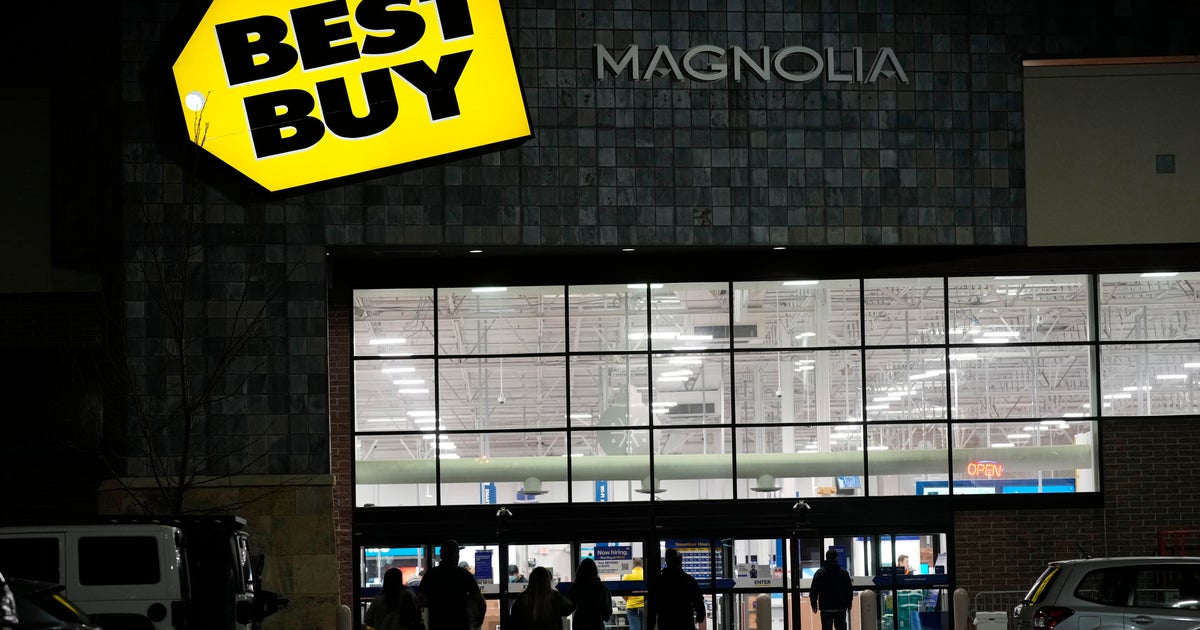Best Buy, the nation’s largest consumer electronics chain, reported another quarterly sales decline The Americans remained in control on devices and gadgets to focus on essentials.
The Richfield, Minnesota-based retailer lowered its annual sales and profit outlook. Best Buy CEO Corie Barry also warned that shoppers will likely have to pay more for purchases that reflect higher costs as President-elect Donald Trump promises to impose far-reaching tariffs on products from China and Mexico.
Meanwhile, Kohl’s posted third-quarter results that showed a deeper slump and forecast that sales declines this year will be worse than expected. The results came a day after the Menomonee Falls, Wisconsin-based retailer announced that Michaels CEO and retail veteran Ashley Buchanan will take over his top role effective Jan. 15.
Shares of Best Buy fell nearly 8% in midday trading, while shares of Kohl tumbled nearly 19%.
As the latest crop of major retailers report third-quarter earnings results this week, winners and losers are emerging as Black Friday, the official start of the holiday shopping season, approaches.
Macy’s reported stronger-than-expected third-quarter revenue on Monday and said it is delaying the release of full quarterly results, scheduled for Tuesday, after discovering that an employee deliberately hid up to $154 million in expenses over several years.
Walmart, the nation’s largest retailer, reported another quarter of stellar sales last week as its low-price model proved a big draw for inflation-weary shoppers. But Target, whose business depends on discretionary purchases such as clothing and accessories, reported slow sales and declining profits in the fiscal third quarter as customers limited their spending on non-essentials.
On a call with analysts Tuesday, Best Buy’s Barry said the chain was struggling with economic uncertainty, customers waiting for deals and the disruption of the run-up to the election, especially in non-essential categories. Sales are recovering, but Barry noted the season will be highly promotional.
Best Buy started its Black Friday sale on November 21, a week earlier than last year. It’s also bringing back doorbusters – limited-time offers on specific products – every Friday from November 8 to December 20 online, in store and in the app.
“We are well managing what we can control in what remains a volatile environment,” Barry said on the call.
Like other retailers, Best Buy is also bracing for Trump’s threat to impose sweeping new tariffs on Mexico, Canada and China once he takes office as part of his efforts to crack down on illegal immigration and drugs.
Barry said the company believes diversifying its consumer electronics purchasing “is a good thing, but also very difficult to do.” The supply network is complex, as are the factories for consumer gadgets, she said.
In addition, Best Buy has very little control over purchasing and imports only about 2% to 3% of the cost of goods sold directly, she said. Most of them have been moved from China.
But Barry says the retailer is dependent on its suppliers and estimates that 60% of the cost of goods sold comes from China. The second largest importing country is Mexico.
Best Buy has a team studying how the tariffs will impact its business, but she said the retailer is operating on very thin profit margins. So while suppliers and the company will bear some of the costs, Best Buy will have to pass on much of the higher cost of the tariffs to its customers in the form of higher prices.
“These are goods that people need, and higher prices don’t help,” Barry said.
Best Buy earned $273 million, or $1.26 per share, for the quarter ended Nov. 2. That compares with $263 million, or $1.21 per share, a year ago. Revenue fell to $9.45 billion from $9.76 billion in the same quarter last year. Analysts expected earnings of $1.30 per share on revenue of $9.63 billion, according to FactSet.
Comparable turnover – turnover via online channels and physical stores – fell by 2.9% in the quarter.
The company said appliance, home theater and gaming sales fell. This was partially offset by growth in the computers, tablets and services categories.
Best Buy now expects annual sales between $41.1 billion and $41.5 billion, down from previous expectations of $41.3 billion to $41.9 billion. Analysts expected $41.54 billion, according to FactSet.
It now expects earnings per share to be between $6.10 and $6.25, compared to previous expectations of $6.10 to $6.35. Analysts expected $6.26 per share.
Kohl’s reported a profit of $22 million, or 20 cents per share, in the quarter ended Nov. 2. That compares with $59 million, or 53 cents per share, in the year-ago period. Revenue fell from $3.84 billion to $3.51 billion. Analysts expected a profit of 28 cents on revenue of $3.63 billion.
For this year, Kohl’s expects comparable sales to decline 6% to 7% and expects net sales to decline 7% to 8%. The company expects annual earnings per share between $1.20 and $1.50, compared to the average Street estimate of $1.78 per share.







